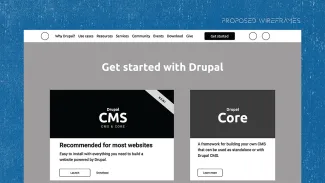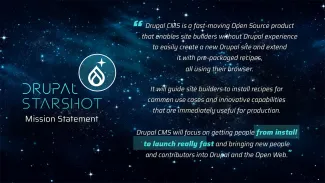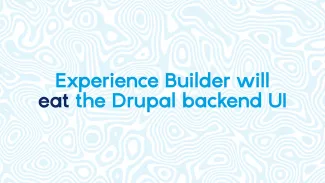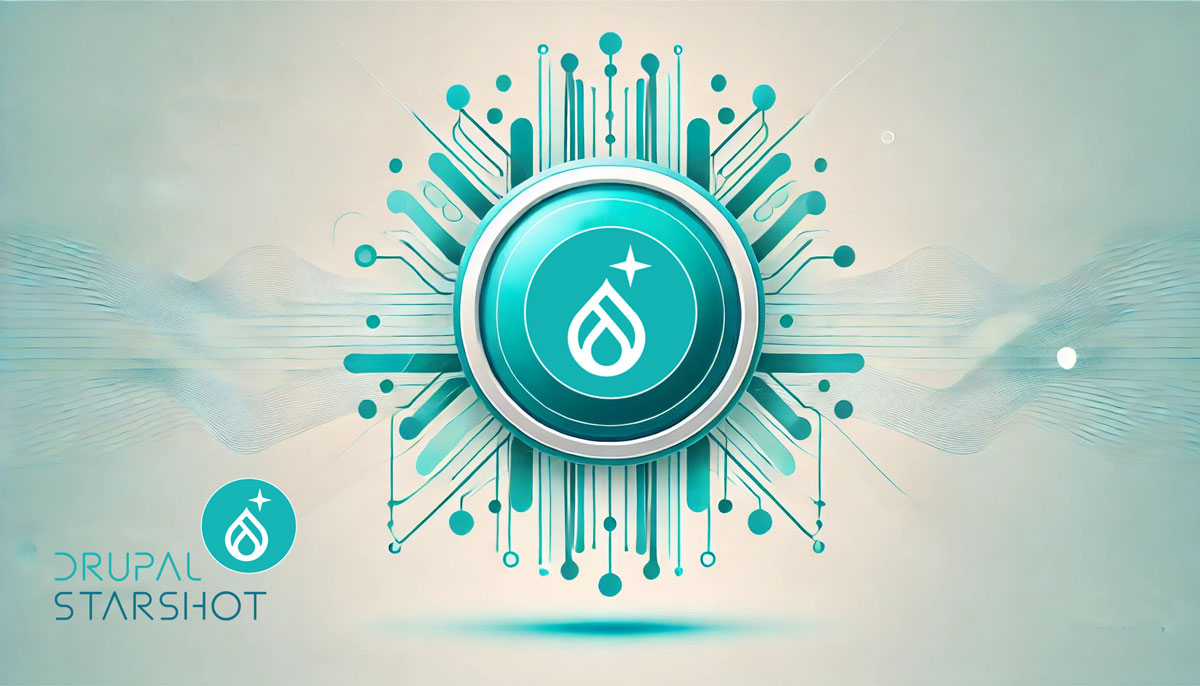Drupal CMS, which was initially tentatively called Drupal Starshot, is set to expand the Drupal landscape and change the Drupal game in a major way. I can call it the Ultimate Drupal Game Changer.
I usually catch up on Driesnote after most Drupal conferences, popularly called DrupalCon. Driesnote is a highly anticipated State of Drupal presentation by Dries Buytaert, the founder of Drupal, that sets the tone for every DrupalCon. During DrupalCon Portland, which was held in May 2024, I decided to catch up on Driesnote. I got to my office on one of the days and tuned in to watch Driesnote. As is the tradition, Dries normally would give updates about the Drupal project’s current state, its roadmap, the community’s achievements, and the future of Drupal. So I sat at my desk watching and expecting him to run through the regular tradition. He talked about low code, no code and how Drupal was "even first to be best at low code" but now many competitors surpass what Drupal provides in many areas. He mentioned the steps Drupal has been taking recently to make Drupal friendly to less technical users. Then he listed new ideas to make Drupal even more friendly to less technical users, and he said:
And so all of this work, weeks and weeks of meetings, really, sort of culminated into one big idea. And I say it's a big idea because, in the 23 years of Drupal, we've never done anything like this. And that idea is basically, Drupal Starshot!
I'm going to explain that to you next. The main idea behind Drupal Starshot is that we're going to have a new version of Drupal almost like a second version of Drupal and that will have a great out of the box experience, and the idea isn't to make an incremental improvement to the out-of-the-box experience, but more of a radical improvement in user experience, and we'll do that with a high sense of urgency and an intense focus on questioning how we do that and the processes and the governance that comes with it.
When I heard this, I was startled from my seat. I paused the YouTube video, sat more properly, cleaned my eyes and ears, shook my head, stared blankly at the screen for a few seconds and then resumed the video. Dries continued:
To help illustrate that and explain that a little bit better, here is kind of a wireframe of the download page on drupal.org and you can see there are two versions of Drupal: Drupal CMS which is essentially Starshot. Think of Starshot as a code name. It's not a product name. The product name might be Drupal CMS, although we haven't really decided that yet to be honest, but it will be recommended. You can see it's bigger than Drupal core which means that we're actually going to recommend it over Drupal core, and we've talked to the Drupal Association, and they're on board with promoting Drupal CMS over Drupal core. If you pay attention, there's also subtle differences, like there's a launch button rather than downloading a Drupal CMS. We're going to allow people to launch it right from the browser.
Here is the slide he showed in the illustration:

I paused the video again, stood up and paced around my office for some minutes, then I sat back again and resumed the video. Dries continued:
All right, so maybe, also importantly, Drupal core isn't going away. It's on the page right, it might be smaller than Drupal CMS, but we don't intend to take away the Drupal that you love. You know, we essentially want to make it easier for more people to love Drupal by making a Drupal CMS available.
[...]
Getting to the Moon actually took eight years, but we don't have eight years as Drupal, so the committer team, again driven by the sense of urgency, we feel like we need to get something in the market, something launched in eight months, basically by the end of this year-ish. It doesn't have to be the final version, it's going to be an initial version available on the download page on drupal.org and then something doesn't get in, it's okay, but we'll quickly iterate. You know we'll release and release again, again and again, and add new features ...
I punched in the air with my clinched fist and screamed, "Yeah! Yeah!! Yeah!!!" and then I felt incredibly delighted at what I had just heard.
The Ultimate Game Changer
I can call Drupal CMS the ultimate game changer for Drupal, at least for site builders, non-technical users, non-technical site owners and everyone else not already familiar with Drupal. Drupal CMS will make Drupal more user-friendly, handy and approachable for these users.
I am comfortable with code editors and the command line, but not every time and for every project, do I enjoy always having to launch a terminal to install a new module or uninstall a module. It is not fun to always have to launch a text editor to be able to style or theme a page, however small is the requirement. Many times I wished I could accomplish most of the work only on the browser.
Drupal CMS will now empower me to start a new project and complete it using only the browser, without touching a code editor or launching a terminal window. Here is another slide that showed the Mission Statement of Drupal CMS:

On the slide, Drupal CMS is referred to as a product. So, this should be the first time the Drupal community is offering a Drupal product that users can take and install and configure to suit their purpose. If I am correct, the only effort closer to this was Drupal Gardens, which was a service that was launched by Acquia back in 2010. It was essentially a Drupal-as-a-Service (DaaS) platform, offering users a simplified way to build Drupal websites without worrying about hosting or setup. Acquia promoted it as a way for non-technical users or developers with limited time to quickly create and maintain Drupal sites. You can liken it to wordpress.com today. Acquia eventually shut down Drupal Gardens in 2016. The shutdown was primarily due to the fact that the service no longer aligned with Acquia’s evolving business strategy, which shifted focus to more enterprise-level cloud hosting and digital experience management services (such as Acquia Cloud and Acquia Site Factory).
Talking about game changers, I was right on point in this blog post I made in 2022, when I wrote this:
There are two items on the list of Drupal's Strategic Initiatives that I personally am so fascinated about. They are the Project Browser and Automatic Updates Initiatives. There is a third one, Recipes.
[...]
Project Browser will solve lots of problems for Drupal. Among the initiatives Drupal has worked on since Drupal 8, the Project Browser and Automatic Updates initiatives are the most game-changing. They both will be serious game changers for Drupal. Mostly for non-developers and also for developers.
Two years later, Drupal CMS is about to be born, and it was inspired, and it is being built on the foundations of the Project Browser, Automatic Updates, Recipes and Experience Builder initiatives. Game changers coming together to produce the Ultimate Game Changer!
The Progress
In May, Dries said the team was working on getting the first release out by the end of 2024. This means it would have taken 8 months to announce, build and release Drupal CMS, which is a feat. However, in his keynote presentation at DrupalCon Barcelona September 2024, he said they had to shift the release date to January 15th, 2025 which also happens to be Drupal's 24th birthday.
Presently there are up to 14 recipes being worked on for Drupal CMS. The way it works is, during the install process, a guide lets you pick the features your project needs. These features are powered by recipes. Then later on also, if you want your website to do certain stuff, then you browse and find a recipe for that and enable it. Drupal will download the modules required to do the stuff you want and also configure them for you. You only now have to look around your dashboard and choose what to turn on or off. This will be intuitive, so you do not have to have special Drupal knowledge to get this working. For example, you want to make an events website, then you select 'Events' feature during installation and all the ingredients you need to publish your events will be set up for you. You want to tune SEO for the website, then you browse around using Project Browser, find and enable an SEO recipe, and all SEO tools are set up for you. You want to start a blog section on the site, then you enable a Blog recipe and boom, you have got a complete blog system activated on the site. Recipes can be added and removed from the website, so there is no lock in, like with distributions.
When the Recipes count blows up and maybe agencies start making themes for Drupal CMS, imagine what Drupal will become like. Drupal will become like a WordPress or Wix, but then one on steroids. On steroids, because you will get similar or even better ease but then you will have available in your hands, the enterprise-grade power of Drupal.
AI will be at play
There is an AI revolution currently going on in Drupal. Drupal was one of the first CMS-es to support Open AI. Within months of Open AI GPT models being released, Drupal had Integrations. Today, the AI space in Drupal is blowing up. Various AI Agents and tools are being developed for Drupal, and it is mind-blowing.
There are almost-production-ready AI agents that can take instructions from prompts and handle site-building tasks. You can ask an agent to create a content type named 'Song' with a description field and an image field. It will do it! You then ask it to create a taxonomy vocabulary called 'Artists' and populate it with the top 20 pop artists in the world, and it will create the vocabulary and populate it with terms like Michael Jackson, Elvis Presley, Prince, Elton John, etc. You will then ask it to reference the vocabulary on the 'Song' content type and name the field 'Artist'. It will do it. You then ask it to move the image field above the description field, and it will do it. You can ask it to create a page of all songs with a filter to sort the songs by artists, and, wait for it, the agent will create the Views page and add the filter using the 'Artist' taxonomy reference field! So you can sit back and issue instructions at prompts and AI agents will build out your website!
There are AI tools in the works to generate web components. The components will be generated complete with HTML and CSS done! If this gets to play with Experience Builder, which is based on Single Directory Components, then there will come a time when you can issue prompts in Drupal UI and your entire site will be created by AI models. You can tell the agents to "add a section with an image to the left and text to the right. Here is the content for the text on the right. Make the heading a blue color and add a transparent green-colored background to the section. Change the background color of the footer section to deep orange and make the menu items on the footer region a white color with a gray hover color". Imagine you just sit and type in prompts and seeing your site get built for you!
In the demo Dries showed at DrupalCon Barcelona, part of the task was importing content from a non-Drupal website to a Drupal website. Typically, a Drupal developer will want to use the Migrate tools available in Drupal to begin to map fields and write YAML files and spend lots of time and money to migrate content from a non-Drupal website, or even a different Drupal website, to another Drupal website. Typically, this is a very demanding exercise. In the demo at DrupalCon Barcelona, an Import with AI feature in Starshot imported a blobby content from a non-Drupal website and structured the content into a Drupal website. Dries again:
All right, let's go back to our story. Sarah has built one Wine Tour page and optimized it for SEO, but her old site has hundreds of pages and almost all of them need to be migrated. This is going to be a nightmare. Weeks of boring repetitive copy and pasting, but unless she can do it, she'll never convince Maria of the benefits of switching to Drupal and, so encouraged by how easy AI has been so far, Sarah asks it for help. All right. So this is actually Sarah's existing website, a non Drupal website and a challenge that she has with it is that all of the content is basically packed into a single body field. So it's essentially one blob of HTML. Now Drupal, on the other hand, uses a more structured approach to data and so the goal here is to convert that HTML blob to a structured Drupal content type. And so, as mentioned, she's going to ask AI to help, so she sees this feature Import with AI and what's really cool about this is you can just enter the URL of the website, and it will crawl the content, and the AI will handle the complex task of mapping all of the content to the different fields. And then when she navigates to it, you can see it figured out the date range and put it in a date field, so it figured out all of the fields, it also analyzed the content, and it knows that it was about Tuscany so it automatically populated the wine region field to be Tuscany, and it figured out the image and stored the image in the image field, which is pretty powerful.
What about Drupal Core?
Drupal CMS is built on Drupal core. It depends on Drupal core. It is not a fork. It is not a parallel project. It is not meant to replace Drupal core. It is simply a different installation profile of Drupal core bundled with prepackaged recipes and configuration.
This means a site started from Drupal CMS is still the same Drupal with all power and capabilities intact. Drupal CMS simply makes this power available to non-technical people to use. It doesn't stop senior developers from working on the same website. It is still Drupal and you can decide to override templates and make custom CSS files, and use Composer and all the geeky stuff.
Senior developers and enterprise users are free to download Drupal core and develop sites their own way. Meanwhile, junior developers, site builders and other people that do not have Drupal knowledge will be equally free to install Drupal CMS, and build their own sites their own way. So Drupal, as we have known it, will stay the same, only a new door is opened in the life of Drupal.
How will this affect Drupal developers and agencies?
I don't have enough information to speak for other Drupal developers, especially the senior developers and big agencies, but from my standpoint of an ambitious site builder who touches a bit of code while I work with Drupal, I can say that this is good news for me. I do not have a big issue editing template files and writing a bit of hooks and working on the command line, but equally I do not like the fact that I have to do all that for every single Drupal site I launch, however small it is. On many occasions, I wished Drupal CMS existed, so I could quickly whip up a website. There definitely is that place, even in the life of the most senior developer, where he wants to click a button and install Drupal, style and theme it and put something live, without all the geeky stuff. That place is there. I have been there countless times. There also remains the place where one has to install Drupal with Composer and launch an IDE.
How do I think this will affect my business as a site builder who has, up till now, built websites for people who could not do it by themselves? I don't know. Drupal CMS will bring more people to use Drupal, which I think will result in more people requiring Drupal support. So, I believe this will be a win-win situation.
More on Experience Builder (XB)
At DrupalCon Lille 2023, Dries announced a new strategic initiative 'to improve and expand Layout Builder to provide a truly intuitive out-of-the-box page building experience'. That initiative became the Experience Builder Initiative, which is a part of the Drupal Starshot Initiative. The goal is to give Drupal a page builder that can match up with any other page builder in the market. The team initially explored many options in the industry but finally settled on a homegrown page builder, primarily because Drupal does not want to sacrifice its commitment to structured content. XB will not dump HTML blobs into the database but will retain Drupal's structured data tradition, even though with a mix of a bit of unstructured data where necessary. XB will combine the best of Layout Builder, Paragraphs and Single Directory Components, which are all Drupal native solutions actively available already. XB will combine their strengths, and then put in-browser theming capabilities and lots of juice.
Unlike Layout Builder which only manages the content region, XB can manage the entire website and will not require Drupal experience to use it.
At DrupalCon Barcelona when Dries wanted to round off his notes on the Experience Builder, he showed this slide:

And then he said:
Now I want to talk a little bit about Experience Builder because as Experience Builder is being developed and as I've been tracking that development it has become clear to me that Experience Builder will reshape Drupal. It will reshape the Drupal admin UI and when I say eat the Drupal admin UI, what do I mean? Well, let's let me basically explain that to you. Today, if you think about the Drupal admin UI, you can think of it as this kind of purple section and for phase one of Experience Builder, we're focused on things like how to use Experience Builder for individual landing pages or, templated, you know, pages, page templates, global sections like maybe the navigation or the footer of every page on your site as well as some content editing as you saw in the video. All right, so great, that's phase one. But we've had conversations about how this might evolve over time and so, if we think about like a phase two or a phase three, now we get into things like how do we enable the Sarah and the Toms of the world to design components? How can we redesign content workflows? Should views be re-implemented in Experience Builder? Views probably need to be re-implemented to make it a more modern, you know, experience and then, most likely, it should be part of Experience Builder. And the same thing with menu management and the list goes on and on and on, and as you start to think about that, now Experience Builder becomes bigger and bigger and bigger and could kind of modernize the whole Drupal UI. Now the thing you should know about Experience Builder is that it's being built in React and so what that means if you can put one and one together, what that means is, it will lead to a React-ification of the Drupal admin UI which is kind of a big deal.
XB will not ship with Drupal CMS in January but will be added in a later release in 2025. Note that it is not being developed for Drupal CMS only but for Drupal generally. And the Recipes also, they will all be available in Drupal generally.
Final Thoughts
Drupal CMS introduces a whole new era for Drupal. It will open the doors of Drupal to people that ordinarily will not find Drupal approachable. Drupal has been criticized for being biased towards the high-end enterprise market and accused of not caring much about non-technical users and the average Joe. When Drupal 8 was released, these accusations and perceptions increased, even though the Drupal community tried to explain them away. With Composer being required to manage the new Drupal (Drupal 8 and newer), the quarters that have accused Drupal of being a CMS for developers had even more reasons to support their claims.
The Drupal community have taken so many steps and started so many initiatives to endear Drupal to low-code, no-code site builders, but yet it didn't really click. With Drupal CMS being like an aggregation of the various initiatives, I think Drupal has finally nailed this debate. Finally, Drupal is no longer for senior developers, nerds, geeks and their deep-pocket clients. Drupal now also has a product for non-technical users without any prior Drupal experience, no-code site builders, low-code ambitious site builders, budget-conscious clients and the average Joe!
Like I said, apart from Drupal Gardens, which attempted something close to this, this is the first time the Drupal community will do something like this, i.e., offer two options to use Drupal.
It is a new era, a new vista and a new experience. I personally can't wait!

